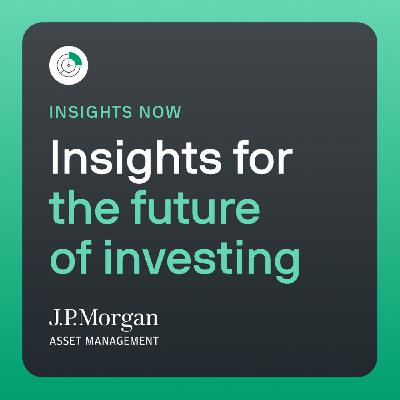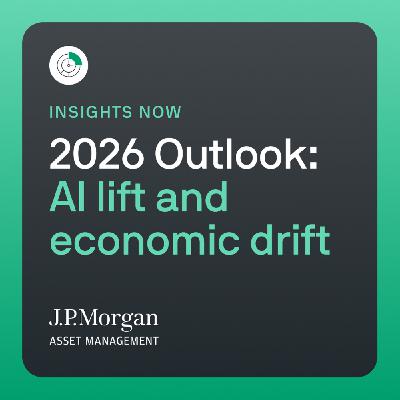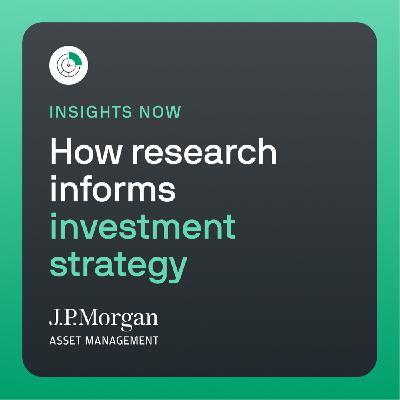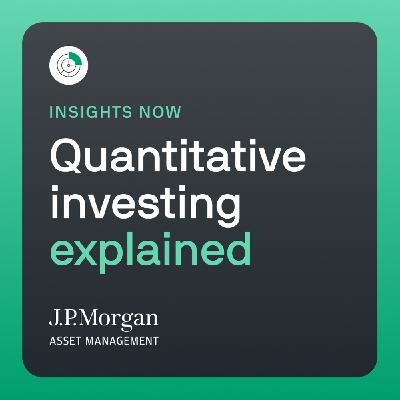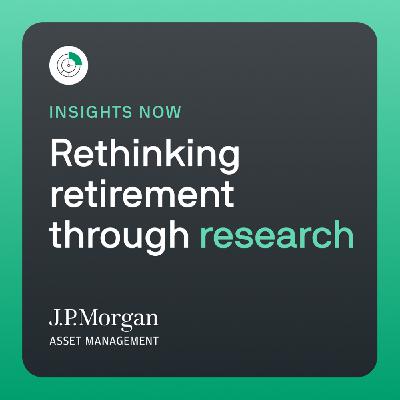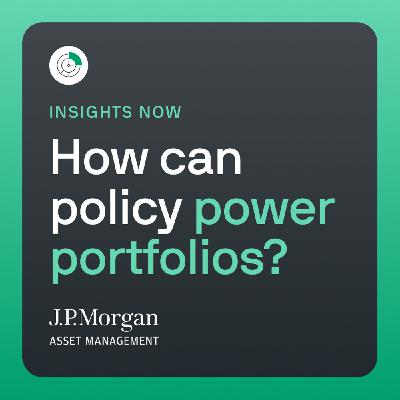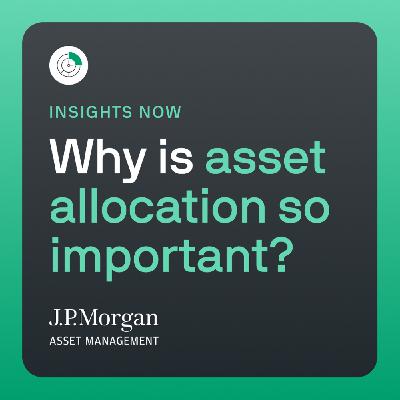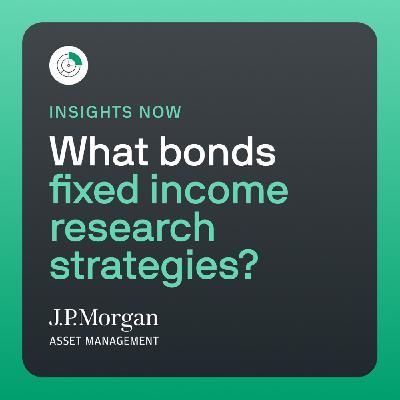Discover Insights Now
Insights Now

Insights Now
Author: Dr. David Kelly and Gabriela Santos, J.P. Morgan Asset Management
Subscribed: 1,590Played: 11,939Subscribe
Share
© Copyright 2024 All rights reserved.
Description
Listen to the latest insights from Dr. David Kelly, Chief Global Strategist, and Gabriela Santos, Chief Strategist for the Americas at J.P. Morgan Asset Management, as they sit down with a variety of thought leaders for a conversational breakdown of big ideas, future trends, emerging topics, and their investment implications, helping to inform the building of stronger long-term investment plans.
145 Episodes
Reverse
In today’s episode, Aaron Mulvihill, Global Alternatives Strategist, is joined by Brian Coleman, Co-Head of Investments for the Private Credit Solutions Group within J.P. Morgan Asset Management, to dive into private credit, an asset class that continues to be popular with investors due to its yield pick-up compared to traditional fixed income. However, private credit does not come without risk. They discuss some of these risks in certain sectors, as well as the outlook for private credit and opportunities outside of direct lending.
Watch the video version on YouTube.
Resources:
For more resources on Alternatives, visit our Guide to Alternatives and Principles of Alternatives Investing
Listen to the audio version of the Alternative Realities podcast: Apple Podcasts | Spotify
Following the announcement of a new Fed chair, we explore the evolving landscape of monetary policy and its impact on markets. Our experts break down what a change at the top could mean for interest rates, inflation and the broader investment environment. The discussion covers the latest Fed meeting, the outlook for rate cuts and the influence of fiscal stimulus on consumer spending and market momentum.
Gain insights into the dynamics of a tight, but not necessarily strong, labor market, the implications of shifting immigration trends and the potential for inflation to remain sticky in the months ahead.
Join Jordan Jackson, Global Market Strategist, and Brandon Hall, Research Analyst, as they share their perspectives on the Fed’s direction, market positioning and what lies ahead for investors.
Watch the video version on YouTube.
Subscribe to the Notes on the Week Ahead podcast for more insights from Dr. David Kelly: Apple Podcasts | Spotify
Alternative investments are taking center stage as we look ahead to 2026. With public and private markets converging and new opportunities emerging across asset classes, investors are rethinking how to build resilient portfolios for the long term. That’s why this episode of Alternative Realities brings together three of J.P. Morgan Asset Management’s leading voices: Aaron Mulvihill, Global Alternatives Strategist; Jed Laskowitz, Global Head of Private Markets; and Anton Pil, Head of Global Alternative Investment Solutions.
Drawing on insights from over 45 contributors and a $500 billion alternatives platform, the conversation breaks down the key themes shaping the 2026 Alternative Investment Outlook. From the rapid growth of private equity and the evolution of secondary markets to the inflection points in real assets and infrastructure and the renewed momentum in hedge funds, this conversation covers the trends that matter most for investors navigating today’s complex environment.
Watch the video version on YouTube.
Resources:
For more resources on Alternatives, visit our Guide to Alternatives and Principles of Alternatives Investing
Listen to the audio version of the Alternative Realities podcast: Apple Podcasts | Spotify
As the asset management landscape evolves, investors and advisors face new challenges and opportunities in building resilient portfolios. Discover the latest trends shaping the industry, from the resurgence of fixed income and the growing role of international equities to the increasing adoption of private market assets and active ETFs. Gain timely insight into how technological innovation and personalized investment solutions are empowering advisors to deliver more tailored outcomes for clients.
In this episode, join Dr. David Kelly, Chief Global Strategist at J.P. Morgan Asset Management, as he sits down with Andrea Lisher, Head of Americas Client, to discuss portfolio diversification, the democratization of alternatives and the future of active management in a rapidly changing market environment.
Watch the video version on YouTube.
Subscribe to the Notes on the Week Ahead podcast for more insights from Dr. David Kelly: Apple Podcasts | Spotify
In this episode of Alternative Realities, Aaron Mulvihill is joined by David Lebovitz, Global Strategist on the Multi-Asset Solutions team at J.P. Morgan Asset Management. Together, they delve into J.P. Morgan’s Long Term Capital Market Assumptions (LTCMAs)—now marking their 30th annual publication. The LTCMAs serve as a cornerstone resource, providing return, volatility and correlation estimates for over 200 asset classes in 17 currencies. Widely respected across the industry, these assumptions help guide approximately $1 trillion in long-term investment portfolios.
Watch the video version on YouTube.
Resources:
For more resources on Alternatives, visit our Guide to Alternatives and Principles of Alternatives Investing
Listen to the audio version of the Alternative Realities podcast: Apple Podcasts | Spotify
Gain timely insights into the uncertainty and opportunity that define the investment landscape for 2026 in “AI Lift and Economic Drift.” This engaging discussion unpacks how resilient U.S. economic growth is set against a backdrop of powerful structural trends, including the transformative impact of artificial intelligence. Key themes include the importance of diversification, the challenges posed by elevated starting points for risk assets and the need for thoughtful portfolio construction to navigate ongoing market divergences.
Join Gabriela Santos, Chief Market Strategist for the Americas, alongside David Kelly, Chief Global Strategist and Jack Manley, Global Market Strategist, as they share expert views and strategies to help investors prepare for the year ahead.
Watch the video version on YouTube.
Subscribe to the Notes on the Week Ahead podcast for more insights from Dr. David Kelly: Apple Podcasts | Spotify
On this episode, Aaron Mulvihill is joined by Jared Gross, Head of Institutional Portfolio Strategy, who brings over 30 years of experience providing insights and solutions to institutional clients—including corporate and public pensions, endowments and foundations—and Tina Anstett, ERISA Strategist, and an attorney with more than three decades of expertise in workplace retirement plans. Together, they will discuss the implications of the President’s recent executive order, “Democratizing Access to Alternative Assets for 401(k) Investors” and address the questions that have emerged as a result. They will explore what this order means for retirement plans and who stands to be affected, and weigh the potential benefits and risks of adding alternative assets to plan portfolios.
Watch the video version on YouTube.
For more resources on Alternatives, visit our Guide to Alternatives and Principles of Alternatives Investing
From complexity to clarity: A measured approach for evaluating private investments in DC plans
Listen to the audio version of the Alternative Realities podcast: Apple Podcasts | Spotify
In today’s rapidly evolving investment landscape, staying ahead means understanding how asset allocation strategies are adapting to new market realities. This episode of Insights Now explores the dynamic interplay between macroeconomic trends, policy shifts and the growing importance of research in portfolio construction. From the impact of fiscal and trade policies to the rise of alternatives and real assets, our experts discuss how diversification beyond the traditional 60/40 model is helping investors build resilience against inflation, rate shocks and other market disruptions.
In this episode, join Gabriela Santos, Chief Market Strategist for the Americas, and David Kelly, Chief Global Strategist, as they reflect on the season’s most important takeaways from the Multi-Asset Solutions team and share their outlook for the future of asset allocation.
Watch the video version on YouTube.
Subscribe to the Notes on the Week Ahead podcast for more insights from Dr. David Kelly: Apple Podcasts | Spotify
Private equity’s footprint in the sports industry has expanded rapidly in recent years. As global team valuations reach unprecedented levels, the sector has become a focal point for both investors and fans, reshaping the broader investment landscape. With capital pouring into sports franchises and valuations climbing steadily over the past two decades, the market is evolving—and so are the opportunities and risks.
On today’s episode, Aaron Mulvihill sits down with Tyler Jayroe, a portfolio manager with more than 20 years at J.P. Morgan Asset Management. Together, they’ll unpack the key drivers behind the surge in sports franchise valuations, examine where investment dollars are flowing and highlight the most important trends and challenges facing investors in this space.
Watch the video version on YouTube.
For more resources on Alternatives, visit our Guide to Alternatives and Principles of Alternatives Investing
Listen to the audio version of the Alternative Realities podcast: Apple Podcasts | Spotify
Shifting macroeconomic trends and evolving consumer behavior continue to redefine the investment landscape, challenging asset managers to adapt their strategies for long-term success. Discover how multi-asset research teams at J.P. Morgan Asset Management approach asset allocation in a rapidly changing environment, with a particular emphasis on consumer markets. Key themes include lessons learned from years of investing in the consumer sector, the value of understanding where consumers are spending, and the use of proprietary data to identify emerging trends and shifts in confidence.
In this episode, Gabriela Santos, Chief Market Strategist for the Americas, and guest Daniel Bloomgarden, Global Head of Research for Multi-Asset Solutions, discuss how technology continues to reshape retail, the complexities of building and maintaining strong consumer brands and the ways companies are adapting to ongoing supply chain disruptions and tariff challenges.
Watch the video version on YouTube.
Subscribe to the Notes on the Week Ahead podcast for more insights from Dr. David Kelly: Apple Podcasts | Spotify
In this episode, Aaron Mulvihill, Global Alternatives Strategist, is joined by Ashmi Mehrotra, Global Co-Head of J.P. Morgan Asset Management’s Private Equity Group, and Jeremy Beal, Head of Products and Advisory Solutions at Morgan Stanley Wealth Management. The discussion covers how access to alternative investments is expanding to more investors, current developments in private equity and the role these assets can play in today’s investment portfolios.
Watch the video version on YouTube.
For more resources on Alternatives, visit our Guide to Alternatives and Principles of Alternatives Investing
Listen to the audio version of the Alternative Realities podcast: Apple Podcasts | Spotify
In today’s rapidly evolving investment landscape, understanding how quantitative strategies are shaping asset management is more important than ever. This episode explores the dynamic world of quant investing, offering financial advisors and investors practical insights into how systematic, data-driven approaches are transforming portfolio construction and risk management. Discover how quant models identify market inefficiencies, adapt to shifting macroeconomic conditions, and complement traditional fundamental strategies to deliver robust, diversified outcomes.
In this episode, join Gabriela Santos, Chief Market Strategist for the Americas, as she sits down with Grace Koo, Co-Head of Risk Managed and Total Return Portfolios at J.P. Morgan Asset Management. Together, they unpack the opportunities and challenges of quant investing, sharing actionable perspectives for advisors and investors seeking to stay ahead in a changing market.
Watch the video version on YouTube.
Subscribe to the Notes on the Week Ahead podcast for more insights from Dr. David Kelly: Apple Podcasts | Spotify
On today's episode, Aaron Mulvihill, Global Alternatives Strategist, is joined by Stephen Dulake, Co-Head of Global Fundamental Research at JP Morgan. Together, they discuss private credit, an asset class that has attracted significant investor interest due to its higher yields compared to traditional fixed income. The conversation explores the factors driving growth in the private credit industry, examines how yields compare to public fixed income and where they may be headed and highlights the key risks and opportunities in this evolving market.
Watch the video version on YouTube.
For more resources on Alternatives, visit our Guide to Alternatives and Principles of Alternatives Investing
Listen to the audio version of the Alternative Realities podcast: Apple Podcasts | Spotify
Explore the evolving landscape of retirement investing in today’s shifting macroeconomic environment. Discover how retirement is not just a destination, but a dynamic journey shaped by individual needs, spending patterns and regulatory changes. Gain valuable perspectives on the impact of recent policy changes, the increasing adoption of alternatives like real estate and private equity in retirement portfolios and the importance of balancing liquidity and market risk.
Join Gabriela Santos, Chief Market Strategist for the Americas, as she sits down with Katherine Santiago, Head of Quantitative Research for J.P. Morgan’s Multi-Asset Solutions team, to discuss data-driven strategies, regulatory updates, and actionable tips for navigating the future of retirement investing.
Watch the video version on YouTube.
Subscribe to the Notes on the Week Ahead podcast for more insights from Dr. David Kelly: Apple Podcasts | Spotify
With new developments like shifting flows in hedge funds and private credit and the growing impact of AI on data centers, investors are navigating a rapidly changing landscape. On this episode, Aaron Mulvihill, Global Market Strategist, is interviewed by Grant Papa, Research Analyst, to answer the top questions clients are asking about allocating smarter with alternatives.
Together, they dive into the outlook for private equity exits and explore how investment philosophies are evolving between traditional drawdown funds and evergreen structures. Tune in for timely insights into the risks and opportunities across alternative asset classes, including strategies for approaching real estate as rate cuts approach and understanding the true level of risk in private credit.
Watch the video version on YouTube.
For more resources on Alternatives, visit our Guide to Alternatives and Principles of Alternatives Investing
Listen to the audio version of the Alternative Realities podcast: Apple Podcasts | Spotify
As fiscal, trade, and regulatory policies take center stage, adapting asset allocation strategies has never been more important. This episode explores how today’s policy shifts—from fiscal stimulus and rising tariffs to accelerated deregulation—are shaping market opportunities and risks. Our Multi-Asset Solutions team examines the short- and long-term impacts of recent legislation, the evolving role of government in markets, and the distributional effects on both consumers and corporations. Gain perspective on how higher debt levels, changing demand for Treasuries, and sector-specific policy changes are influencing portfolio decisions, and why staying agile is key in a landscape defined by uncertainty and transition.
Join Gabriela Santos, Chief Market Strategist for the Americas, and Geng Ngarmboonanant, Research Analyst on the Multi-Asset Solutions team, as they break down the latest policy developments and share practical insights for navigating today’s complex investment environment.
Watch the video version on YouTube.
Subscribe to the Notes on the Week Ahead podcast for more insights from Dr. David Kelly: Apple Podcasts | Spotify
This episode delves into the dynamic world of hedge fund investing with Paul Zummo, Chief Investment Officer. Celebrating three decades of success, Paul and his team manage over $35 billion in hedge fund assets, catering to both institutional and high-net-worth clients. As the hedge fund landscape evolves, Paul shares insights into why volatility and abrupt policy changes are not just challenges but opportunities for hedge fund managers. With the potential for higher alpha on the horizon, Paul offers a unique perspective on the past, present and future of hedge fund investing.
Watch the video version on YouTube.
For more resources on Alternatives, visit our Guide to Alternatives and Principles of Alternatives Investing
Listen to the audio version of the Alternative Realities podcast: Apple Podcasts | Spotify
Read more of JPMAAM’s Pearl Anniversary Insights: 30 "pearls" of wisdom from our last 30 years here.
As economic and policy environments shift, understanding how tactical and strategic asset allocation can adapt is crucial for financial advisors and investors alike. Balancing long-term views with short-term market movements, our Multi-Asset Solutions team highlights the opportunities presented by volatility and dislocation. Discover how credit markets, particularly U.S. high yield, are being tactically adjusted in response to current valuations, and learn why diversification remains a vital strategy.
Join Gabriela Santos, Chief Market Strategist for the Americas, and David Lebovitz, Research Analyst and member of the Fundamental research team to unpack the complexities of asset allocation, offering valuable insights for achieving long-term investment goals.
Watch the video version on YouTube.
Subscribe to the Notes on the Week Ahead podcast for more insights from Dr. David Kelly: Apple Podcasts | Spotify
J.P. Morgan's Private Bank offers expert guidance to assist affluent clients and their families in achieving their financial objectives. With a global oversight of more than $2.9 trillion in client assets, the bank boasts a legacy of over 200 years of operation.
On today’s episode, Aaron Mulvihill is joined by Sitara Sundar, Head of Alternative Investment Strategy & Market Intelligence. She spearheads the development of perspectives within and across alternative investments for the bank. Her extensive experience within the organization includes leading the Equity Specialist team, where she provided strategic advice on managed equity portfolios for clients. Before this, Sitara supported J.P. Morgan’s Chief Financial Officer as part of a corporate economics and analytics team, where she was responsible for forecasting global macroeconomic data. At the onset of her career, she worked alongside the firm’s Chairman of Market & Investment Strategy, Michael Cembalest, contributing to the widely acclaimed "Eye on the Market" publication.
Watch the video version on YouTube.
Resources:
Subscribe to the Notes on the Week Ahead podcast for more insights from Dr. David Kelly: Apple Podcasts | Spotify
Research analysts play a pivotal role in fixed income markets, where active management is crucial due to the vast array of issuers and securities. The fixed income industry encompasses a diverse range of bond sectors, including rates, emerging market debt, municipals, high yield and securitized debt, each offering a unique set of complexities and opportunities for investors to explore. As economic policies evolve, fixed income research analysts navigate heightened volatility, especially in interest rates and credit spreads. Their insights underscore the importance of strategic analysis and investment in quality issuers and assets to effectively address these challenges.
In this episode, Gabriela Santos, Chief Market Strategist for the Americas, is joined by Dr. David Kelly, Chief Global Strategist at J.P. Morgan Asset Management. Together, they share expert perspectives on the evolving fixed income landscape and reflect on insights gathered from fixed income research analysts.
Watch the video version on YouTube.
Subscribe to the Notes on the Week Ahead podcast for more insights from Dr. David Kelly: Apple Podcasts | Spotify





